Grapes And Raisins Uses, Research, Remedies, Side Effects
Grape is the one of the must-have fruits for everyone. Ayurveda says “Drakshaa Phalottamaa” , which means – of all the fruits, grapes are the best. When we go to the fruit market, we can not always get the sweet grapes. We may get a more-sweet-little-sour variety or more-sour-little sweet variety etc. Each of those varieties have their own effect on Tridosha and our health as a whole. Let us explore the Ayurvedic health benefits of grapes varieties -dry and fresh, unripe, semi ripe, fully ripened etc.
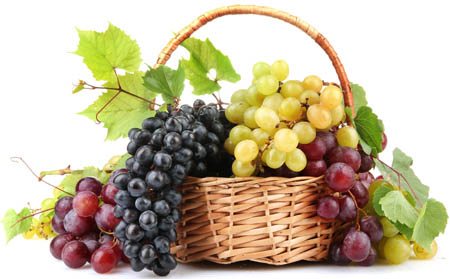
Botanical name – Vitis vinifera Linn
Family- Vitaceae (Draksha Kula)
Table of Contents
Grapes benefits
Unripe grapes:
Unripe grapes are hot and pungent in nature, can cause Pitta imbalance, leading to skin and blood vitiation.
Semi ripened grapes:
Semi ripened grapes are more sour than sweet. It improves appetite, improves taste.
More sweet less sour ripened grapes:
Ripened grapes relieve thirst, useful in bleeding disorders, calms Pitta, it is soothing.
Dry Grapes or Raisin benefits
Helps in easy bowel movement
Natural coolant
Very good for eyes
In most of the Ayurveda preparations, where grapes are mentioned as ingredients, dry grapes are used.
Dry grapes / raisins are useful in the treatment of excessive thirst, fever, respiratory problems, vomiting, gout, liver disorders, excessive burning sensation, dryness, emaciation.
Raisin calms the mind. Hence, it is a good idea to have some grapes when you feel tired, burnt out or confused.
Raisins are also used in the treatment of intestinal disorders.
Raisin is especially used in treating hangovers due to excessive alcohol intake and to reduce the effect of alcohol on the body.
Hence it is advisable for regular alcoholics to have dry grapes often.
10-12 raisins are soaked in water. After 2-3 hours, on maceration it is taken to relieve burning chest.
For students, to avoid tiredness, it is advised to soak 5 raisins overnight. the next morning, throw away the water and eat the soaked raisins (Source: Divine Park)
तृष्णादाह ज्वरश्वास रक्तपित्त क्षतक्षयान्|
वातपित्तमुदावर्तं स्वरभेदं मदात्ययम्||१२५||
तिक्तास्यतामास्यशोषं कासं चाशु व्यपोहति|
मृद्वीका बृंहणी वृष्या मधुरा स्निग्धशीतला||१२६||
tṛṣṇādāha jvaraśvāsa raktapitta kṣatakṣayān|
vātapittamudāvartaṃ svarabhedaṃ madātyayam||125||
tiktāsyatāmāsyaśoṣaṃ kāsaṃ cāśu vyapohati|
mṛdvīkā bṛṃhaṇī vṛṣyā madhurā snigdhaśītalā||126|| – Charaka Samhita Sutrasthana 27
Raisin provides immediate cure for
Trishna – excessive thirst,
Daha – Burning sensation
Jwara – fever
Shwasa – asthma, respiratory disorders involving difficulty in breathing
Raktapitta – bleeding disorders like nasal bleeding and menorrhagia
Kshata – chest injury
Kshaya – tuberculosis, chronic respiratory diseases wasting of muscles
Vata Pitta disorders
Udavarta – bloating
Swarabheda – hoarse voice
Madatyaya – alcoholism
Tiktasyata – bitter taste in tongue
Asya Shosha – mouth dryness
Kasa – cold, cough
Raisins are
Bruhmani – improves nourishment
Vrushya – aphrodisiac
Madhura – sweet
Snigdha – unctuous, oily
Sheetala – coolant
Mootradosha – urinary tract infections
For gastritis, acidity, oral thrush, mouth blisters – Soak five almonds and raisins in water at night. Next morning, eat the raisin and almonds on an empty stomach. Make sure that the raisins are sweet in taste.
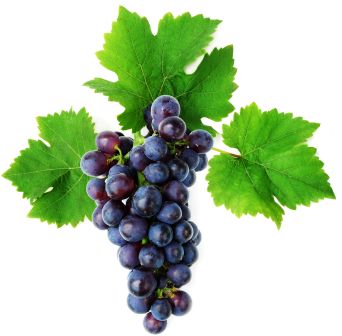
General medicinal qualities of grapes
Guna (qualities) – Snigdha – unctuous, oily, Guru (heaviness),
Rasa (taste) – Madhura – sweet
Vipaka- Madhura – sweet taste conversion after digestion
Veerya – Sheeta Coolant
Effect on Tridosha – Balances Vata and Pitta
Pharmacological action – Laxative, Stomachic, Diuretic, Blood purifier
Classical categorization
Charaka-
Kanthya – Voice improving and throat soothing group of herbs, |
Virechanopaga – Purgation aiding group of herbs
Kasahara – Cough relieving group of herbs
Shramahara – Tiredness relieving group of herbs
Kaiyadeva Nighantu –
Oshadhi Varga – Group of medicinal herbs and substances
Madyavarga – group of herbs from which wine can be prepared
Triphala Bheda – another set of herbs called Triphala –
द्राक्षापरुषकार्श्मयफलैः क्वापि फलोत्तमा ||३||
Grapes, Parushaka and Gambhari fruit (Gmelina arborea)
Dhanvantari Nighantu has named
Swadu Triphala – Grapes, dates and Kashmari fruit (Gmelina abrorea)
Second type of Swadu Triphala – Grapes, dates and pomegranate
This book also classifies Grapes as Santarpana foods – nutrition rich foods
Susruta and Vagbhata – Parushakadi gana
Bhavaprakasha – Amradi Phala varga (group of fruits such as mango). This book has classified it as – Svabhavataha hitkara dravya – one of the naturally healthy substances that is good for all.
Grapes qualities and uses
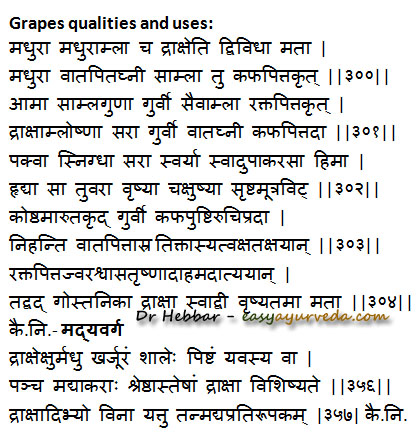
Grapes qualities based on stages and type:
Based on taste, grapes can be classified as sweet and sweet-sour.
The sweet variety balances Vata and Pitta Dosha.
Sour grapes increase Kapha and Pitta dosha.
Unripe grapes have similar qualities as sour ones. It is Guru – heavy to digest, and may worsen bleeding disorders.
Sour grapes qualities
Ushna – Hot
Sara – induces mobility, causes diarrhea, purgation, relieves constipation
Guru (heaviness)
Vataghna – useful in treating disorders of Vata Dosha imbalance such as neuralgia, paralysis, constipation, bloating, etc
Kaphapittada – Increases Kapha and Pitta
Ripe grapes qualities
Snigdha – unctuous, oily
Sara – induces mobility, causes diarrhea, purgation, relieves constipation
Swarya – improves voice tone and quality
Madhura Vipaka (taste conversion after digestion)
Hima – coolant
Hrudya – acts as cardiac tonic, congenial for heart
Vrushya – aphrodisiac, improves vigor
Chakshushya – improves vision, good for eyes, useful in eye disorders
Srushta mutra vit – increases volume of urine and feces
Tuvara – astringent variety qualities
Koshtamaruta krut – it may increase Vata in the gut
Vrushya – aphrodisiac
Pushtida – nutrition rich
Sweet grapes indications
Sweet Grapes are generally indicated in –
Raktapitta –Bleeding disorders such as nasal bleeding, heavy periods, etc
Tiktasya – tongue with bitter taste
Kshata – injury, bleeding
Kshaya – depletion of body tissues, weight loss, tuberculosis
Jwara – fever
Shwasa – asthma and chronic respiratory disorders
Trushna – excessive thirst
Daha – burning sensation, as in gastritis, neuropathy, burning sensation in eyes etc
Madatyaya – alcoholism
Kamala – Jaundice, Liver diseases
Moha – delusion, dizziness
The Gostani variety of draksha – elongated, bigger variety resembling cow udder possess similar qualities. It has better aphrodisiac qualities.
Guru – heavy to digest
Kaphapittahrut – Balances Kapha and Pitta dosha
Of all the fruits used to prepare wine, grapes are the best.
Resveratrol, sirtuins, anti aging
How grapes help us to live longer?
Dr Janardhana V Hebbar BAMS, MD(Ayu), PGDPSM
The body cells multiply thousands of times in our lives.
When they are multiplying, naturally, due to the process of aging, over a period of time, some DNA information from the mother cells to the daughter cells are not passed on. Some information is lost.
With some DNA information loss, the cells start behaving strangely.
Eg: Hair colour change, wrinkling of skin, lack of muscle strength, memory loss etc.
There are longevity genes in our body cells. These genes are – SIRT1 – SIRT7.
They are called sirtuins.
Sirtuins help all DNAs and chromosomes to remember what the original cellular functions are.
Skin cell – to form a protective layer, to sweat etc.
Brain – to think, memory, dream etc.
Liver – to act as the chemical factory
Heart – to pump the blood
Blood – to have blood cells
WBC – immunity etc. Cells when they are reproducing more are vulnerable. When they are self repairing, they last long.
During stress, sirtuins avoid reproduction and order for repair and protect from heart disease, Alzheimer’s, diabetes, cancer etc.
They prevent cell death, boost mitochondria
They prevent muscle wasting, osteoporosis, macular degeneration of eyes etc.
SIRT 1 avoids weak cell reproduction by repairing the damaged parts then and there.
More SIRT1 = better repair = less damaged cells in the body.
SIRT1 activating compound = Resveratrol also does promote sirt1 activity, better than fisetin of strawberry.
Resveratrol is from grape skin.
It is also Found in red wine.
French paradox
French people eat saturated fat – butter and cheese. But still they have good heart health.
Lower rates of heart disease due to French wine. Resveratrol is found in French wine. (1)
Read related: Wine benefits
Shloka, Sanskrit Verse
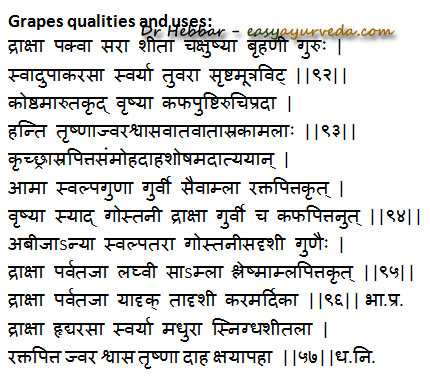
Abeeja – seedless grapes:
Seedless variety – has lesser qualities than those of Gostani variety
As per Ashtanga Hrudayam Sutrasthana 6/115-116–
Draksa (grapes) is best among fruits, is aphrodisiac, good for the eyes, helps in the elimination of urine and feces, sweet in taste at the end of digestion, unctuous, slightly astringent, cold potency, hard to digest, cures diseases of vata, pitta and rakta; improves taste in the mouth, relieves intoxication, thirst, cough, fever, respiratory conditions, hoarseness, injury to the lungs and chronic respiratory diseases. 115-116 ½
According to Bhojana Kuthalam, Draksha is sweet and sour in taste, has cold potency and helps in treating burning sensation, difficulty in micturition, improves taste perception, is aphrodisiac in nature and nourishes the body.
Gostani Draksha: Is sweet in taste, cold in potency, cardio tonic and treats intoxication. It cures burning sensation, fatigue, fever,dyspnoea, thirst and excessive salivation.
Dweepadraksha: Is sweet and sour in taste, cold in potency, imparts taste, treats dyspnoea, cough, excessive salivation and is liked by people.
Incompatibility
Grapes with milk are best avoided. Because Ayurveda advises to avoid sour fruits processing with milk.
Substitute:
If grapes or raisins are not available, the fruits of Gambhari – (Kashmari phala – Gmelina arborea) are traditionally used as a substitute. – Bhava Prakasha.
Home remedy:
Raisin, Amla, Ginger, honey remedy for cough and asthma
Dry grapes home remedy for gastritis
Interaction with medicines, supplements
Can this be used while taking Homeopathic medicine?
Yes. This product does not react with homeopathic medicine.
Can this medicine be continued while taking supplements like multivitamin tablets, Omega 3 fatty acids etc?
Yes. Generally, this product goes well with most dietary supplements. However, if you are taking more than one product per day, please consult your doctor for an opinion.
With western
medicines
Seek your
doctor’s advice if you are taking this product along with other western
(allopathic / modern) medicines. Some Ayurvedic herbs can interact with modern
medicine.
If both Ayurvedic and allopathic medicines are advised together, then it is
best to take Allopathic medicine first, wait for 30 minutes and then take the
Ayurvedic medicine.
Ayurvedic medicines
Ayurvedic medicines with raisin as ingredient:
Draksharishta – useful in cold, cough, asthma, colon cleansing.
Drakshasava – useful in intestinal worms, injuries, wounds
Drakshadi Kashayam – useful in hangover treatment, tiredness, dizziness etc.
Manasamitra vatakam – used in treating depression, loss of memory, psychiatric conditions.
Drakshadi Vati – tablet, used in anorexia, heartburn, dizziness, indigestion
Research
Evaluation of anti candida activity
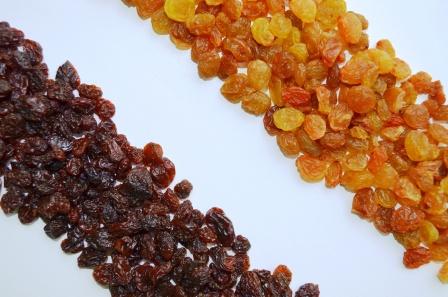
Grapes are good for the eyes; useful in bleeding diathesis; relieves thirst and parched feeling of the throat; benefits a debilitated and cachexic person; provides comfort in patients suffering from vomiting, dyspnoea, fever, bitter taste in mouth and those intoxicated by alcohol.
When the grapes get digested completely it causes rasa, rakta etc., tissue generation through its nourishing actions. It is beneficial to be used in kaphaja type of fever and in urticaria rashes [sita pitta]. It acts as a laxative and diuretic at times.
The wine [madanakara kolA] prepared from dried grapes provides relief from distension of the abdomen, burning sensation and tiredness by providing energy through its nutritional value [tarpanakara].
Action on Doshās: Pacifies the vata [samiirashamanii] and pittaM.
Grapes or Raisin – which is better?
द्राक्षाबिल्वशिवादीनां फलं शुष्कं गुणाधिकम् ||५१|| – Bhavaprakasha.
drākṣābilvaśivādīnāṃ phalaṃ śuṣkaṃ guṇādhikam ||51||
In the case of grapes, bael fruit and Haritaki (Harad fruit), – the dried fruits are better than the fresh.
Grape seed oil for dry mouth
Grape-seed oil for xerostomia – dry mouth:
- It is a good and effective remedy to eliminate symptoms of dry mouth. It has a moisturizing property which coats your mouth and keeps it moist for a longer period of time. It is high in Vitamin E and thus can heal mouth sores.
- Rub some oil on your tongue and inside your cheeks with your fingers. Leave it overnight.
- Next morning, rinse your mouth with warm water and then brush your teeth
- Repeat daily before going to bed
Market available varieties of grapes
Grapes, muscadine, raw
Taste – sweet
Properties – unctuous, heavy
Potency – cold
After digestion taste transformation (Vipaka) – sweet
Effect on Doshas
Vata balancing
Pitta balancing
Kapha increasing
Grape juice, canned or bottled, unsweetened, with added ascorbic acid
Taste – sweet
Properties – unctuous, heavy
Potency – cold
After digestion taste transformation (Vipaka) – sweet
Effect on Doshas
Vata balancing
Pitta balancing
Kapha increasing (since it is juice extract, it is slightly more Kapha increasing than raw fruit; addition of vitamins make it more nourishing, so Kapha increasing)
Grapes, american type (slip skin), raw
Taste – sweet
Properties – unctuous, heavy
Potency – cold
After digestion taste transformation (Vipaka) – sweet
Effect on Doshas
Vata balancing
Pitta balancing
Kapha increasing
Grapes, red or green, raw
(European type, such as Thompson seedless)
Taste – sweet
Properties – unctuous, heavy
Potency – cold
After digestion taste transformation (Vipaka) – sweet
Effect on Doshas
Vata balancing
Pitta balancing
Kapha increasing
Grapes, canned, thompson seedless, water pack, solids and liquids
Taste – sweet
Properties – unctuous, heavy
Potency – cold (more cold than raw grapes as it is water pack)
After digestion taste transformation (Vipaka) – sweet
Effect on Doshas
Vata balancing
Pitta balancing
Kapha increasing (slightly more kapha increasing than raw grapes, thompson seedless)
Calories per 100 g (40) is less than that of raw grapes (69) as storing in water pack may cause the grapes to swell and cause dilution in concentration)
Grapes, canned, thompson seedless, heavy syrup pack, solids and liquids
Taste – sweet
Properties – unctuous, heavy
Potency – cold
After digestion taste transformation (Vipaka) – sweet
Effect on Doshas
Vata balancing
Pitta balancing
Kapha increasing (heavy syrup pack is more concentrated, hence more kapha increasing than raw grapes)
Grape juice, canned or bottled, unsweetened, without added ascorbic acid
Taste – sweet
Properties – unctuous, heavy
Potency – cold
After digestion taste transformation (Vipaka) – sweet
Effect on Doshas
Vata balancing
Pitta balancing
Kapha increasing
Grape juice, canned or bottled, unsweetened, with added ascorbic acid and calcium
Taste – sweet, slightly sour
Properties – heavy for digestion
Potency – not very hot
After digestion taste transformation (Vipaka) – sweet
Effect on Doshas
Vata balancing
Pitta balancing
Kapha increasing
Grape leaves, raw
Grape leaves, canned
Taste – sour
Properties – not very heavy (as boiling before canning makes it light), dry
Potency – cold
After digestion taste transformation ( Vipaka ) – sour
Effect on Doshas
Vata nourishing (due to reduced heaviness)
Pitta balancing
Kapha balancing
Market available variants of Raisins
Raisins, golden, seedless
Golden raisins are slightly higher in calories per cup than black and also have a little more sodium and an extra gram of fiber. The differences in calories and sodium are so small as to be negligible, however.
Taste – sweet
Properties – unctuous
Potency – cold
After digestion taste transformation (Vipaka) – sweet
Effect on Doshas
Vata balancing (useful in kshaya, kshata)
Pitta balancing (used in burning sensation, fever, bleeding disorders)
Kapha nourishing (nourishing, is aphrodisiac)
Raisins, dark, seedless (Includes foods for USDA’s Food Distribution Program)
Seedless variety of grapes have lesser qualities than seeded grapes
Taste – sweet
Properties – unctuous
Potency – cold
After digestion taste transformation (Vipaka) – sweet
Effect on Doshas
Vata balancing (useful in kshaya, kshata)
Pitta balancing (used in burning sensation, fever, bleeding disorders)
Kapha nourishing (nourishing, is aphrodisiac)
Raisins, seeded
Taste – sweet
Properties – unctuous
Potency – cold
After digestion taste transformation (Vipaka) – sweet
Effect on Doshas
Vata balancing (useful in kshaya, kshata)
Pitta balancing (used in burning sensation, fever, bleeding disorders)
Kapha nourishing (nourishing, is aphrodisiac)
Botanical description
Kingdom: Plantae
Class: Angiosperms
Order: Vitales
Family: Vitaceae
Genus: Vitis
Species: V. vinifera
Botanical name – Vitis vinifera Linn
Vernacular names
Hindi name- Angoor, Dakh, Munakka, Angoor
English name- Grapes
Telugu name- Drākṣa ద్రాక్ష
Kannada name – Drakshi, Ona Drakshi, draksi hannu
Tamil name – Tirāṭcai திராட்சை, kottai thiratchai.
Marathi name – Drākṣē द्राक्षे, dakshache-jhad, draaksha, kakanj.
Malayalam name – മുന്തിരി [muntiri] മുന്തിരിപ്പഴം [muntirippaḻaṁ], dhrakshai, gostani, mridvika.
Spanish name – Uvas
Gujarati name – Darakh
Urdu name – Aab-e-angur, angoor
Persian name – ab-josh.
Arabic name – aenab,ainab,kishmish,mewez.
Hindi: angoor, angur,dak,sakh,drakh.
Sanskrit Synonyms of grapes
Mrudvika – soft in nature. Usually raisins are called by this name
Gostani – resembles cow udder
Swaduphala, Madhurasa, Madhuyoni – sweet in nature
Bruhmani – nourishing
Rasaala – juicy
Guda – sweet as jaggery
Vrushya – aphrodisiac
Krushna – black in nature
Priyala, Tapasapriya, Charuphala – fruit with good looks
Harahura, Kashmeerika, Karamardika
Uttarapatha – Commonly cultivated in Northern region
Guchaphala – Fruit occur in bunches
Yakshmaghni – It is beneficial in Emaciated disorders
Phalothama – Draksha is considered as best among fruits according to Chakara
Sramapaha – Consumption of fruit helps to relieve fatigue
Harahuraa – Fruit is used to prepare wine
Morphology
Vitis vinifera is a deciduous woody vine, tendrils long, bifid. Leaves are 7.5-15 cm long, 5-25 cm broad with long petiole, simple circular or circular ovate, more or less deeply (3- 5) lobed, margin irregularly and coarsely toothed. Inflorescence bears small, 5 petals, yellow-green flowers. Fruits are berry, ellipsoid or globose in shape, bluish black or greenish in color, consisting of 2-4 seeds.
Dose
Juice – 40 -50 ml
Distribution
Vitis vinifera is cultivated in Punjab, Rajasthan, Delhi, Uttar Pradesh Maharashtra, Karnataka, Andhra Pradesh and Tamil Nadu
Vitis vinifera chemical composition
Fruits-(+) Catechin, Epicatechin, B- Sitosterol, Ergosterol, Jasmonic acid
Resveratrol – a type of phenol, found in grapes, has some evidence against heart diseases, cancer.
Sthanika Karma (Systemic Action)
Internal administration-
Nervous System – Medhya (promote intelligence), mind calming, indicated in Alcoholic intoxication (Madathaya)
Digestive System – Being unctuous, cold, and sweet in taste helps to reduce thirst, promote downward movement of vatadosha. Indicated in constipation, jaundice etc.
Circulatory System – Strengthen heart, reduce bleeding, purify blood.
Respiratory System – Strengthens respiratory muscles and lungs. promote healing, helps to eliminate excess kapha. Indicated in damage of respiratory / chest area, Hoarseness of voice, Cough, breathing difficulty etc.
Excretory System – its seed has diuretic action. Indicated in burning micturition
Reproductive system – Garbha sthapana (Helps to retain pregnancy) and Aphrodisiac. indicated in lower semen count, uterine weakness etc.
Satmikarana – Promote health. Indicated in general weakness
Tvak (Skin) – Indicated in burning sensation
Tapakrama – beneficial in fever and excessive thirst











48 comments
A-kay
Should we avoid dried grapes (raisins) with milk too? Isn’t it common to add raisins in payasam (or kheer) which is usually milk-based?
Dr J V Hebbar MD(Ayu)
It is ok to process raisins with milk. As they are not sour in nature.
vijay
the water in which raisins are soaked has nutritional value. Then why throw instead of drinking?
PPI
Grapes improve metabolism and have diuretic, anti inflammation, light laxative and inducing perspiration effect.The fruit provides instant energy. The fruit is good to consume in conditions like gout, rheumatism, constipation and disorders of skin and liver.
JK
Nice information. Thanks. Can you please provide information on the difference between kishmish (without seed) and Munakka (with seed). I think both are prepared from the grapes. The benefits both offer etc and way to consume them.
Rajalakshmi Gopalan
An enlightening article ! A simple and less expensive home remedy easily available. It is also said taking 10 gm of raisins everyday will strengthen bones.
jovesu
Thank you sir for the wonderful information. Its very useful.
Dr J V Hebbar MD(Ayu)Author
Welcome 🙂
Poonam
Thanks. Very informative article. Should one consume the seeds or discard them while eating?
Dr J V Hebbar MD(Ayu)Author
If one is comfortable in eating the seeds along with fruit, then they can be eaten.
MT
There are three varieties available in Western countries. Sultanas, Raisins and Black currant. Which one is the best from Ayurveda perspective?
Dr J V Hebbar MD(Ayu)Author
Raisins.
Raj Sekhar
Do you think grape seed extract is a rasayana (like potentiated/bhavna amla powder/rasayana)? Could you mention the properties of Grape seeds?
Dr J V Hebbar MD(Ayu)Author
Hi, I have not yet found the reference for grape seed benefits as per Ayurveda.
Kanth
Sir , how to consumes dry grapes to increse body mass when person severe vata imbalance??
Dr J V Hebbar MD(Ayu)Author
10 raisins are soaked in water at night. Next day morning, it is consumed on empty stomach. It increases Body mass and balances down Vata.
Shubham
Dear Dr Hebbar,
What is the difference between green and black raisins? Which one is less kapha provoking.
Thanks
Dr J V Hebbar MD(Ayu)Author
Both are similar. More the sweetness, more Kapha provoking quality.
jogabonito14
Hi Sir, What is the difference between black and brown grapes? Which is better for health and daily consumption
Dr J V Hebbar MD(Ayu)Author
Both are quite similar in qualities.Both are good to take.
aman
Hello dr..i just want to know whether grapeseed powder also balances vata and pitta or have some other effect on ayurvedic humours?
Dr J V Hebbar MD(Ayu)Author
It also balances Vata and Pitta.
shiv jha
sir if i discard overnight soaked raisins water ,then is their any possibility to gain all the nutritional value from raisins,,i am confused because i have heard that overnight soaked raisin water contains leached nutrients from raisin
Dr J V Hebbar MD(Ayu)Author
Hi, you can drink the water also. No need to discard.
Mitesh
Are raisins good for curing gout? Some sites say it should be avoided due to high fructose level which can flare up gout. I’m confused.
Dr J V Hebbar MD(Ayu)Author
raisins are not useful in curing gout.
Alabama aithal
Is any increase in the weight if we consumed draksharishta……
Dr J V Hebbar MD(Ayu)Author
Not with just 10 ml a day
Dr J V Hebbar MD(Ayu)Author
Cold. You can take in summer. It pacifies Pitta.
Sumit khanna
Is it safe to eat sundried munakka (large golden raisins with seed) in summers.As many people tell that they are hot in nature.Please guide.
Dr J V Hebbar MD(Ayu)Author
It is safe to eat them.
Shruti
Sir,
I soak some raisins, dates, dried figs, walnuts and cashews at night in some water. I soak all of them together in one bowl of water. In the morning I mix the above along with the soaking water and grind it with milk. Is it safe to use the soaking water of above dried fruits and nuts.
Thanks
SivaDurga
Can you please provide the reference sanskrit quotes for Swadu triphala & Swadi triphala? I searched the web, but can’t find another website saying SWADI TRIPHALA!
Dr J V Hebbar MD(Ayu)Author
Will update soon.
Hiten
Hello sir…i have occipital neuralgia…pls sir tell me …which medicine work for me
Vinita
Black seed Raisins help with UTI and also vata pitta kapha?
Rachael
Dr. Hebbar, the research paper you have mentioned in your article is about grapefruit juice, not grape juice. Grapefruit is a citrus fruit, please research on it.
Dr J V Hebbar MD(Ayu)Author
Thanks. Corrected.
Vijayalakshmi
Can we include raising with curd rice or just plain curd
Dr J V Hebbar MD(Ayu)Author
Raisin with curd or curd rice is fine. It can slightly increase Kapha Dosha, but it is fine.
Durgesh
Sir, is it safe to take Shilajit and Ashawagandha with raisin millk in night before sleep.
Dr J V Hebbar MD(Ayu)Author
Yes, for a month time.
VIJAYALAKSHMI TUMMAPUDI
Are their any combinations that should be avoided when using raisins. Is it OK to eat raisins on empty stomach, in combinations with other dry fruits likes pista, walnuts, figs etc. Can we add it to rice preparations like pulav etc. Can we add it to curd rice?
Dr J V Hebbar MD(Ayu)Author
There are very less rules for raisins. If it is sour, avoid it with milk.
Having raisins on empty stomach is very fine. In fact, soaking 10 raisins in water overnight and having it next day morning, is a very good remedy to control Pitta conditions such as migraine, gastritis etc.
Having raisins along with dry fruits likes pista, walnuts, figs etc., rice preparations like pulav and curd rice is fine.
K.V.Ramadoss
Excellent article of a common item easily available to everyone. So also your clarifications on the questions raised. Thank you, Sir.
Kiran R Donthi
Golden Raisins are treated with Sulphur Dioxide to retain the beautiful yellow colour therefore Dark Raisins are better & chemical free. Its listed on the box of eg. Sun Maid company yellow raisins.
Deekay Oberoi
Water in which raisins are soaked is to be thrown as advised. Could you please explain reasons for this?
Dr J V Hebbar MD(Ayu)Author
It can be consumed, no problem. But the main part of the nutrients will still be intact in the swollen raisins.